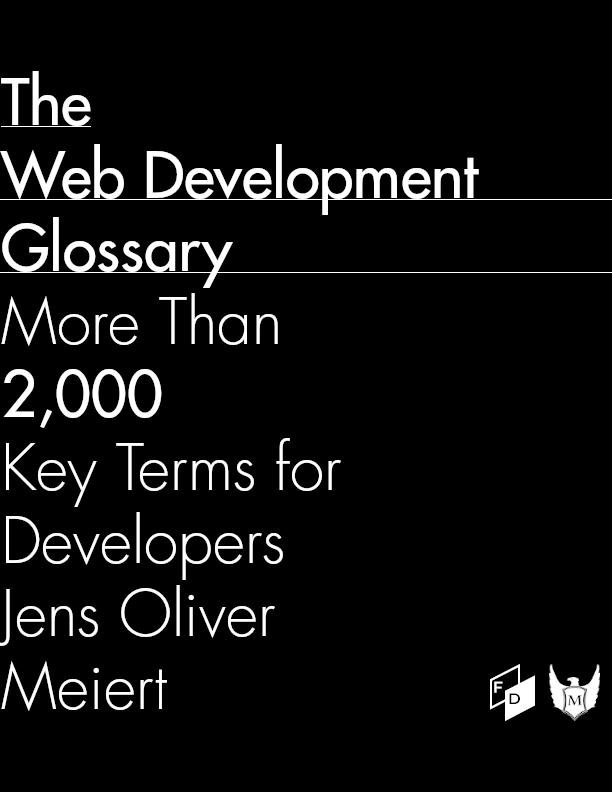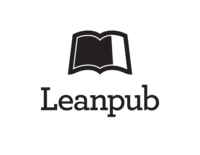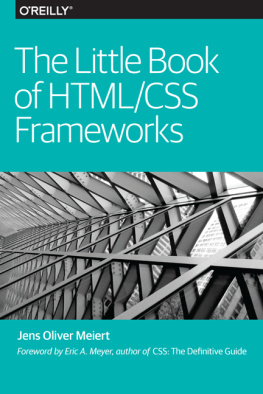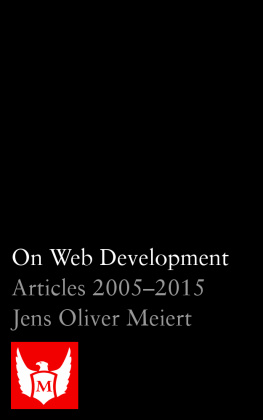Jens Oliver Meiert - The Web Development Glossary
Here you can read online Jens Oliver Meiert - The Web Development Glossary full text of the book (entire story) in english for free. Download pdf and epub, get meaning, cover and reviews about this ebook. year: 2020, publisher: leanpub.com, genre: Computer. Description of the work, (preface) as well as reviews are available. Best literature library LitArk.com created for fans of good reading and offers a wide selection of genres:
Romance novel
Science fiction
Adventure
Detective
Science
History
Home and family
Prose
Art
Politics
Computer
Non-fiction
Religion
Business
Children
Humor
Choose a favorite category and find really read worthwhile books. Enjoy immersion in the world of imagination, feel the emotions of the characters or learn something new for yourself, make an fascinating discovery.

- Book:The Web Development Glossary
- Author:
- Publisher:leanpub.com
- Genre:
- Year:2020
- Rating:3 / 5
- Favourites:Add to favourites
- Your mark:
- 60
- 1
- 2
- 3
- 4
- 5
The Web Development Glossary: summary, description and annotation
We offer to read an annotation, description, summary or preface (depends on what the author of the book "The Web Development Glossary" wrote himself). If you haven't found the necessary information about the book — write in the comments, we will try to find it.
The Web Development Glossary — read online for free the complete book (whole text) full work
Below is the text of the book, divided by pages. System saving the place of the last page read, allows you to conveniently read the book "The Web Development Glossary" online for free, without having to search again every time where you left off. Put a bookmark, and you can go to the page where you finished reading at any time.
Font size:
Interval:
Bookmark:

This book is for sale at http://leanpub.com/web-development-glossary
This version was published on 2021-07-14

* * * * *
This is a Leanpub book. Leanpub empowers authors and publishers with the Lean Publishing process. Lean Publishing is the act of publishing an in-progress ebook using lightweight tools and many iterations to get reader feedback, pivot until you have the right book and build traction once you do.
* * * * *

This work is licensed under a Creative Commons Attribution-ShareAlike 4.0 International License
For Beatriz.
The Web Development Glossary would not have been possible without help. I thank Gabriele Kretzschmar for review of the manuscript, and Ganesh Subramanian and Yaroslav Kiyenko for advice on book details. I am also grateful to Wikipedia, the MDN Web Docs, and all their contributors for their own work mapping the web development landscape, and allowing others to build on that work. Thank you.
I also thank Lucas Frank Weatherhog, Dan Shappir, Shaun OConnell, Moritz Giemann, and J. Albert Bowden II who contributed with corrections and suggestions to the glossary, as well as Red Onion for their friendly support.
This is a glossary for web development.
It covers more than 2,000 important, useful, and historic terms and abbreviations relevant for web (and software) developers.
The glossary acquaints and reunites you with the major standards and concepts of the Web, with HTML, CSS, JavaScript, accessibility, security, performance, code quality, internationalization, localization, editors and tooling and more. It then goes beyond web development, touching on computer science, design, typography, usability and user experience, information as well as project management, other disciplines of interest and relevance to the modern developer. It goes beyond, inspiring the curiosity to learn more about the Web and the people creating and using it.
The glossary does not tell a story in the same way as other books do, but it still tells a story. It tells a story that is sterile yet messy. It tells a story that only started three decades ago and that is still unfolding. It tells a story that starts with you. Why you? Because you are at your own stage of web developmentand because web development is only unfolding, only so alive, because of people like you, people who take a personal interest in it. When you read the glossary like you would read another book, you may notice. (Yet still, it is a glossary.)
Many explanations and definitions in this glossary are based on Wikipedia and the MDN Web Docs. It was neither necessary nor desirable to come up with a new and different explanation for every term.
Arrows () point to the expanded forms of abbreviations, and to the more common synonyms and expressions. Sometimes they take you on a little detour, but only to be transparent about the journey taken (like Personal Home Page PHP Hypertext Preprocessor, or HTML 5 HTML HyperText Markup Language). This may seem lengthy, but it aims to make meanings, relationships, and sometimes history more clear. An arrow may also point at a term that encompasses the referring term, or at a related concept, and therefore does not necessarily indicate equivalence or identity.
Whenever there is a source of great quality or immediate use, explanations include references to external documentation and software.
Some terms and abbreviations have several meanings. Only the tech-related ones are shown.
Sometimes there is imprecision: Is a home page a special type of web page, or is a homepage just another word for a website? (Per this book, trying to gauge how most people use the respective terms, it is.)
Unfortunately, there are going to be inconsistencies, probably errors, and perhaps also controversy. Please help improve the glossary as well as, if applicable, Wikipedia and MDN Web Docs. Giving back to the communities, work on the book has led to numerous small improvements to both Wikipedia and MDN Web Docs articles, but it is unlikely that these improvements covered all there was to improve. Thank you for sharing your knowledge and taking the time to contribute as well.
The Web Development Glossary is licensed under a CC BY-SA 4.0 (Attribution-ShareAlike 4.0 International) license.
A great number of explanations build on Wikipedia. They are marked and attributed in the Appendix. The original material is licensed under a CC BY-SA 3.0 license.
Some explanations build on the MDN Web Docs. They are marked and likewise attributed in the Appendix. The original material is licensed under a CC BY-SA 2.5 license.
A handful of explanations build on the HTML Living Standard. They are marked . The original material is licensed under a CC BY 4.0 license.
Use this glossary at your own risk. Despite all passion and care that went into producing this book, I, Jens Oliver Meiert, assume no liability for errors or omissions in its contents. All information is subject to change and provided as is, with no guarantees of completeness, accuracy, or usefulness.
This all being said: Enjoy. Web Development is a great field.
$2y$, $apr1$, or {SHA}) or salt. The hash historically used Unix crypt style with MD5 or SHA1 as common alternatives, although as of version 2.2.18 a variant of MD5 is now the default..NET.NET Framework.NET FrameworkA software framework developed by Microsoft that runs primarily on Microsoft Windows. The .NET Framework includes a large class library named as Framework Class Library (FCL) and provides language interoperability (each language can use code written in other languages) across several programming languages. Programs written for the .NET Framework execute in a software environment (in contrast to a hardware environment) named the Common Language Runtime (CLR). The CLR is an application virtual machine that provides services such as security, memory management, and exception handling. As such, computer code written using the .NET Framework is called managed code. FCL and CLR together constitute the .NET Framework..NET was first released in 2002.Font size:
Interval:
Bookmark:
Similar books «The Web Development Glossary»
Look at similar books to The Web Development Glossary. We have selected literature similar in name and meaning in the hope of providing readers with more options to find new, interesting, not yet read works.
Discussion, reviews of the book The Web Development Glossary and just readers' own opinions. Leave your comments, write what you think about the work, its meaning or the main characters. Specify what exactly you liked and what you didn't like, and why you think so.











![Jens Gustedt [Jens Gustedt] - Modern C](/uploads/posts/book/146099/thumbs/jens-gustedt-jens-gustedt-modern-c.jpg)